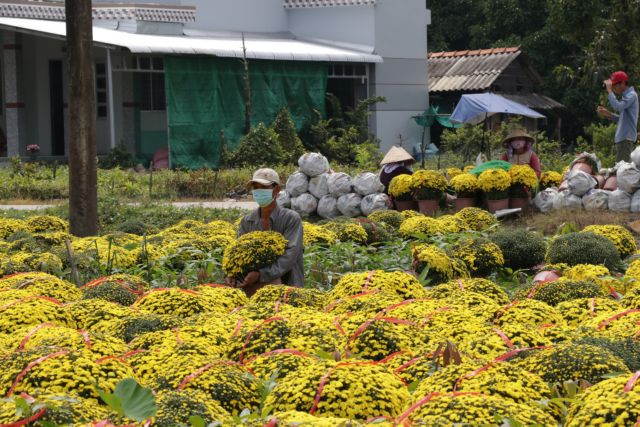.jpg) Environment
Environment


|
| Farmers prepare to sell flowers during the 2019 Tết in Bến Tre Province’s Chợ Lách District. – VNA/VNS Photo Huỳnh Phúc Hậu |
BẾN TRE – The unusually early saltwater intrusion this year is threatening the farming of flowers and ornamental plants in Bến Tre Province’s Chợ Lách District, the Cửu Long (Mekong) Delta’s largest producer of flowers and ornamental plants.
Chợ Lách is growing more than 11 million pots of flowers and ornamental plants for Tết (Lunar New Year), which falls on January 25 next year, according to the district Bureau of Agriculture and Rural Development.
Phan Thị Bé of the district’s Long Thới Commune is worried about a shortage of water to irrigate her 1,000 pots of chrysanthemum since saltwater from the sea has come upriver.
Her chrysanthemums are in the budding stage and need a lot of water.
She now has to use water from her family’s tank to irrigate them and it takes a lot of time.
“I now use a mug to pour water directly at the root to save water,” she said.
Earlier she was using a water pump and pipe, and it was quick work, she said.
Her family’s tank can only provide water for the flowers for another two days.
She will have to buy water and fears she will suffer losses as a result.
Đặng Văn Dũng, chairman of the Hưng Khánh Trung B Commune Farmers Association in Chợ Lách, said the deep intrusion of saltwater occurred suddenly and so farmers were not able to store water.
The salinity in the Cổ Chiên River shot up from 0.1 per cent on December 6 to 0.6 per cent on December 12, and the saltwater had also intruded deep into irrigation canals, he said.
It entered Chợ Lách through the province’s two main rivers, Cổ Chiên and Hàm Luông.
The salinity rates had never been so high in previous years since Chợ Lách is located furthest from the sea in the province, the bureau said.
Bến Tre is one of the delta’s provinces to be most affected by climate change.
Bùi Thanh Liêm, head of the bureau, said saltwater had entered deep into fields, directly affecting more than 600ha of flowers and ornamental plants in the district.
The bureau had instructed farmers to help monitor the salinity in rivers and canals and store water during low tides when rivers and canals have freshwater.
Farmers should use water thriftily and adopt techniques that help increase drought resistance for their plants, it added.
Chợ Lách has 13,000 households that rely on flowers and ornamental plants for a livelihood. – VNS




